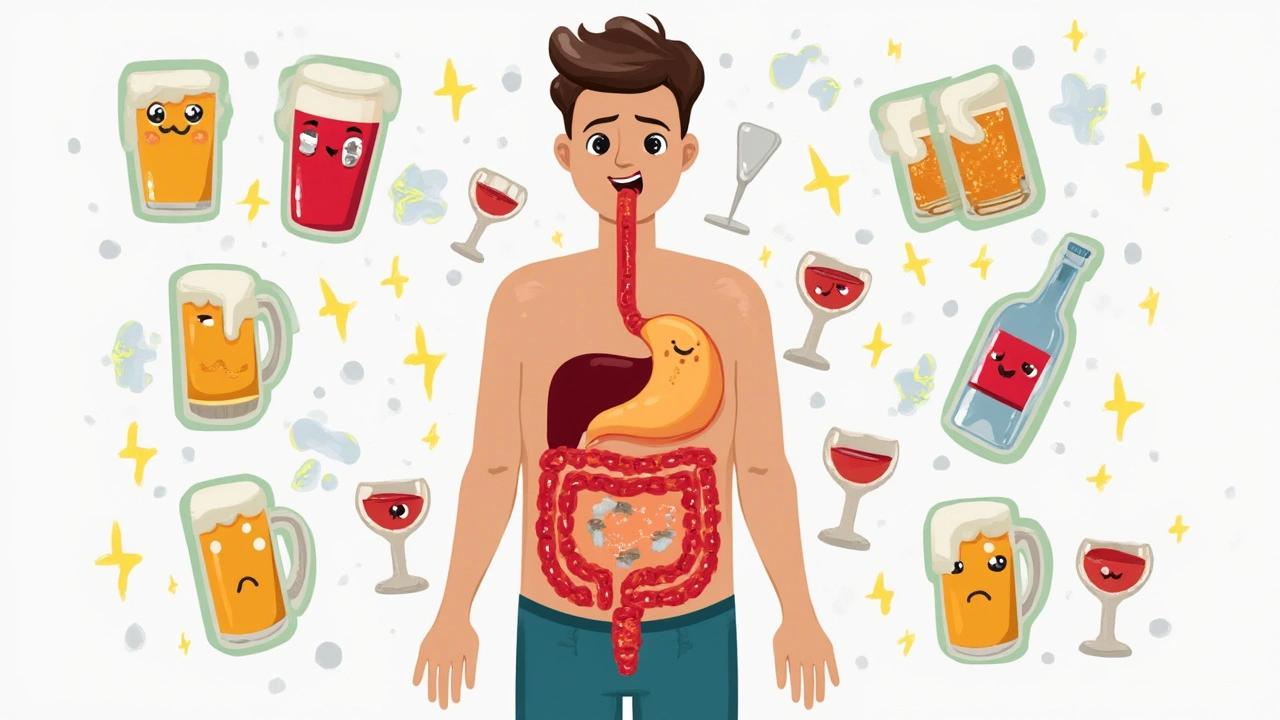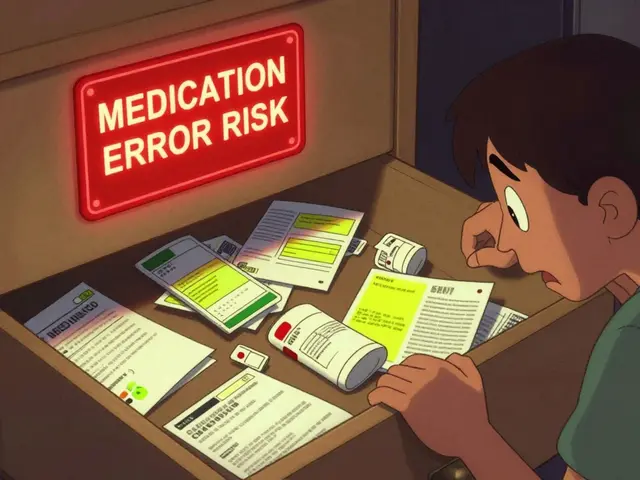If even a couple of drinks leave your stomach grumbling, you’re definitely not alone. Alcohol messes with your digestion in a bunch of sneaky ways, often leading to tummy-ache, heartburn, or just that general feeling of being off. Most folks notice it after a few pints or a round of shots—cue the bloating, cramping, or sudden dash to the bathroom.
It turns out, alcohol isn’t just going straight to your head. It can irritate the lining of your stomach almost immediately, making it pump out more acid than usual. Ever felt that burning sensation after a cocktail? That’s your stomach acid working overtime, and it’s not doing your gut any favors. And if you like sugary mixers or bubbly drinks, the gas and sugar can pile on the discomfort even more.
You don’t have to be a heavy drinker to feel these effects, either. A simple glass of wine on an empty stomach can set you up for trouble. If you’re prone to tummy-aches or have a sensitive gut, knowing how alcohol acts inside your body is a big deal. Let’s get into what really happens, which drinks are true stomach-wreckers, and how you can avoid those next-day regrets.
- What Happens in Your Gut When You Drink
- Common Tummy Troubles Linked to Alcohol
- Why Some Drinks Are Worse on Your Stomach
- Truth About ‘Safe’ Limits for Sensitive Guts
- Simple Tips to Reduce Digestive Problems
- When to Worry: Signs It’s More Than a Tummy-Ache
What Happens in Your Gut When You Drink
Ever wonder what’s actually happening in your gut once you start sipping alcohol? Right off the bat, alcohol heads to your stomach, where it can start doing its damage. It irritates the stomach lining, which pushes your body to pump out extra acid. That extra acid often leads to tummy-ache, burning, or even nausea if you go too hard or drink on an empty stomach.
But there’s more. Alcohol messes with the way your stomach muscles work—slowing down how fast food leaves your stomach and heads into your intestines. That’s why you might feel heavy, super full, or notice bloating after a night out. It’s like your digestion process suddenly hit the brakes.
Once the alcohol moves into your small intestine, it gets absorbed quickly into your bloodstream, but that fast absorption can throw off the balance of your gut bacteria. If these bacteria get out of whack, it can cause cramps, gas, or even diarrhea (hello, bathroom emergencies). A lot of people don’t realize their gut health can actually take a beating just from a few drinks.
Check this out: some studies show that even moderate drinking can raise the risk of reflux or “acid indigestion” by up to 50% compared to non-drinkers. Here’s a quick look at what happens, step-by-step:
- Stomach lining gets irritated – leads to acid overdrive.
- Digestion slows down – food hangs around longer, leading to discomfort.
- Gut bacteria balance shifts – can trigger bloating and other digestive issues.
- Absorption speeds up – which can make you tipsy faster but also can aggravate your stomach.
If you already have a sensitive gut, all this just makes things worse. So next time you’re reaching for a drink, know that there’s a whole chain reaction going on in your digestion, not just in your head.
Common Tummy Troubles Linked to Alcohol
Most people who drink know that alcohol and a happy belly don’t always go together. Stomach pain, better known as the classic tummy-ache, is just the start. Drinking can set off a whole lineup of stomach issues, even if you’re just having a couple with friends.
Here’s what often happens after you knock back a few:
- Bloating and Gas: Alcohol, especially beer and bubbly drinks, can make your stomach swell up and feel tight. The gas from mixers adds on, giving you that uncomfortably full feeling.
- Heartburn: Many notice a burning chest or throat after drinking. Alcohol relaxes the muscle at the top of your stomach, so acid leaks up, causing that classic heartburn.
- Nausea and Vomiting: The stomach lining gets irritated by alcohol. Too much too fast and your body tries to clear it out, fast.
- Diarrhea: Alcohol speeds up your gut muscles, pushing stuff through before the body can soak up water. This often equals the dreaded next-day bathroom runs.
- Cramping and Stomach Pain: All that irritation and acid can make your gut spasm. Not fun if you’re trying to sleep off a night out.
It’s not just heavy drinkers who deal with these symptoms. Some people are just more sensitive. For example, one report by the American College of Gastroenterology found that up to 30% of folks with irritable bowel syndrome admit that alcohol makes their gut problems worse.
| Tummy Trouble | How Often People Notice It After Drinking |
|---|---|
| Bloating | Very common—especially with beer and cocktails |
| Heartburn | Common—up to 15% of drinkers, more if you already get heartburn |
| Diarrhea | Surprisingly often—mainly after binge drinking or cocktails |
| Nausea | Common after heavy or quick drinking |
So, if you’ve ever wondered why you get a tummy-ache after a party or a couple of drinks at dinner, now you know—your digestive system’s probably putting up a fight. Spot these issues early, and you’re on your way to handling them better next time.
Why Some Drinks Are Worse on Your Stomach
Not all booze hits your tummy-ache button the same way. Some drinks go down smooth, while others turn your stomach into a war zone. It’s not just about the alcohol itself—what’s mixed in, the bubbles, the sugar, and even the color can make a huge difference when it comes to digestion and gut health.
Let’s break it down:
- High-proof spirits (like vodka, whiskey, rum): These have more pure alcohol in each sip, which means more irritation for your stomach lining. It’s like sending a sledgehammer down instead of a gentle nudge.
- Sweet cocktails or liqueurs: The extra sugar isn’t just empty calories—it messes with your gut bacteria and, for plenty of people, triggers quick bloating or cramps. Ever felt gassy after a handful of mojitos? That’s why.
- Carbonated drinks (beer, sparkling wine, hard seltzers): Bubbles force gas into your stomach. That means more burping, bloating, or that stuffed feeling that isn’t much fun on a night out.
- Red wine: Some folks get a stomachache from the natural tannins in red wine. Plus, it’s fairly acidic, which can bring on stomach pain or heartburn, especially if you’re already prone to acid reflux.
- Mixers (sodas, juice): These amp up the sugar. Too much soda, especially if it’s caffeinated, adds a double whammy—both sugar and caffeine can make your stomach turn somersaults.
Check out the typical troublemakers side by side:
| Drink Type | Common Gut Effect |
|---|---|
| Whiskey/Spirits (40%+ ABV) | Stomach lining irritation, fast tummy-ache |
| Mojito/Sweet Cocktails | Bloating, cramps, diarrhea risk |
| Beer/Sparkling Wine | Bloating, extra gas |
| Red Wine | Heartburn, acid, sometimes headache too |
| Hard Seltzers | Quick feeling of fullness, possible cramps |
If you’ve ever wondered why beer leaves you bloated or why a couple of gin and tonics mess up your whole evening, this is your answer—there’s a lot more going on in your digestion than just the alcohol percentage. Trying to keep your stomach pain in check? Light, non-sugary drinks, and skipping the mixers can make a difference. Even swapping beer for a clear spirit with water can help some people feel a lot better the next day.

Truth About ‘Safe’ Limits for Sensitive Guts
So what’s the magic number of drinks that keeps your tummy-ache at bay? Wish it was that simple. The truth is, there’s no “one-size-fits-all” when it comes to alcohol and your gut. Some people can down a few beers with no sweat, while others get stomach pain or heartburn after just half a glass of wine. If you’ve got a sensitive digestive system, even small amounts can trigger problems.
Doctors usually say that moderate drinking means up to one drink a day for women and two for men. But if your gut is easily upset, even that could be pushing it. According to the American College of Gastroenterology, "everyone’s digestive sensitivity to alcohol is different, and for those prone to gut issues, less is almost always better."
“For folks who already deal with problems like acid reflux or irritable bowel syndrome, cutting back to just one or two drinks per week may be enough to notice a real difference.” — Dr. Samantha Nazareth, gastroenterologist
Want some real numbers? An analysis published by the National Institute on Alcohol Abuse and Alcoholism in 2023 showed that adults with digestive complaints reported symptoms after just 7-10 units of alcohol per week—a lot less than typical "social" drinking levels. Here’s what that actually looks like:
| Drink Type | Standard Serving | Units of Alcohol |
|---|---|---|
| Beer (12oz/355ml) | 1 bottle/can | 1.5 units |
| Wine (5oz/150ml) | 1 glass | 1.9 units |
| Spirits (1.5oz/45ml) | 1 shot | 1 unit |
It pays to know how sensitive your own gut is. Track your symptoms after drinking and look for patterns. If a certain drink or amount leaves you feeling rough every time, cut back even more or switch it out for something friendlier to your digestion. There’s zero shame in setting your own limits if it keeps your stomach calm.
Quick tip: eating a meal before drinking can also help slow down how fast alcohol hits your system, which might ease stomach irritation and pain. No need to tough it out for social reasons—your gut will thank you for listening to what it needs.
Simple Tips to Reduce Digestive Problems
If you enjoy a drink but your gut seems to hate it, there’s no need to swear off alcohol forever. There are real ways to cut down the chance of a tummy-ache or digestive drama. Here’s what actually works—stuff that’s easy to remember when you’re out or at home.
- Eat before you drink. Grabbing a meal or even a snack lines your stomach, giving alcohol less room to irritate it directly. Plain carbs (like bread or rice) and some healthy fats are clutch for this.
- Go slow with your drinks. Your stomach can only handle so much alcohol at once. Spacing out drinks gives your body a fighting chance and keeps that extra acid in check.
- Stick to lighter drinks. Beer, clear spirits, and dry wine usually have fewer “extras” that mess up your gut (think sugar or carbonation), while cocktails packed with mixers or dark liquors are more likely to cause pain or digestive issues.
- Hydrate in between. Water works wonders for balance. A glass between drinks helps water things down and keeps your gut a little happier than if you just keep piling in booze.
- Watch your mixers. Juices and sodas might seem innocent, but the sugar and bubbles crank up the chance of bloating and stomach pain.
- Know your limits. If your stomach usually freaks out after two drinks, stop there. There’s zero shame in saying no, and your gut will thank you.
Here’s a quick breakdown of common drinks and their impact for anyone chasing a safer night:
| Drink Type | Bloating | Stomach Pain | Diarrhea Risk |
|---|---|---|---|
| Clear Spirits (Vodka, Gin) | Low | Low | Low |
| Dark Liquors (Whiskey, Rum) | Medium | Medium | Medium |
| Beer | High (gas) | Medium | Medium |
| Wine (Red, White) | Medium | Medium | Low |
| Sugary Cocktails | High | High | High |
If you notice specific drinks always mess you up, that’s a sign your digestion doesn’t agree with them—swap things around and see what feels better. And if you wake up with heartburn or worse, try antacids or plain yogurt, which can help calm your stomach down.
When to Worry: Signs It’s More Than a Tummy-Ache
Most of the time, a tummy-ache after drinking is just annoying and goes away on its own. But sometimes, your body throws up red flags that mean it’s not just typical stomach pain or mild discomfort from alcohol. Here’s how to tell when your gut is saying, “Get this checked out.”
- Severe or sharp pain: Not the usual crampy feeling, but pain that makes it hard to move, breathe, or even stand up straight.
- Blood in your poop or vomit: This can show up as red streaks, black tarry stools, or “coffee ground” vomit. Blood means it’s time to see a doctor, period.
- Long-lasting symptoms: If pain, nausea, or runs to the bathroom stick around for more than a couple days, something bigger might be going on with your digestion.
- Vomiting for more than 24 hours: Endless throwing up can make you dangerously dehydrated and is a sign alcohol has really messed up your gut.
- Fever and chills: A tummy-ache paired with a temp might mean an infection or serious inflammation, especially if you’ve also been drinking.
Here’s a quick table showing when it’s time to worry about your gut after drinking:
| Symptom | What to Do |
|---|---|
| Severe Abdominal Pain | Call your doctor or go to urgent care |
| Blood in Stool or Vomit | See a doctor right away |
| Persistent Nausea/Vomiting | Medical help if it lasts more than 24 hours |
| Fever and Chills | Get checked for infection or inflammation |
| Can’t Keep Any Fluids Down | Hospital visit—risk of dehydration |
Sometimes, alcohol use can trigger or worsen gut problems you didn’t even know you had—like ulcers, pancreatitis, or serious liver issues. If tummy troubles are regular for you after drinking, be honest with your doctor. There’s no shame, just a better chance of getting help before things get worse.







JOANNA WHITE
April 29, 2025 AT 04:12Been there. One glass of red wine on an empty stomach and I’m sprinting to the bathroom. Turns out my gut hates tannins. Now I eat a banana before drinking and it’s a game-changer. Also, water between sips. Not sexy, but it works.
PS: Hard seltzers are a trap. They taste like air but wreck your gut like a drunk bulldozer.
Cameron Perry
April 29, 2025 AT 07:52So I’ve been tracking my drinks and symptoms for 3 months. Turns out I’m fine with gin and tonic (tonic water, not soda) but vodka cranberry = disaster. Sugar + carbonation = gut apocalypse. Also, I never realized how much my heartburn was from alcohol until I cut out wine. Now I just drink sparkling water with lime. Life’s better.
Jill Amanno
April 30, 2025 AT 00:22You think alcohol is the villain? Nah. It’s capitalism. The industry sells you poison wrapped in glitter and calls it ‘fun.’ They don’t care if your gut screams. They care about your monthly subscription to cheap wine clubs. We’re not drinking to enjoy-we’re drinking to numb the void they created. Wake up. Your stomach isn’t broken. The system is.
Phillip Lee
May 1, 2025 AT 19:49My liver doesn’t care how much you ‘moderate.’ It just wants you to stop. The science is clear: any alcohol is a toxin. Zero is the only safe limit. Stop pretending you’re ‘in control.’ You’re not. You’re just delaying the inevitable. Your gut knows. Listen to it.
Tammy Cooper
May 3, 2025 AT 01:34OMG I thought I was the only one 😭 I drank one beer last night and woke up feeling like a swamp monster. Like my insides were fermenting. I cried. I called my mom. She said ‘maybe stop drinking?’ I didn’t listen. I drank again. Now I’m back here. Help.
Alyssa Hammond
May 4, 2025 AT 17:11Everyone’s acting like this is some groundbreaking revelation. Newsflash: alcohol has been destroying guts since 10,000 BCE. The real scandal is how the medical industry profits off the damage. They give you antacids, then sell you proton pump inhibitors, then charge you $500 for an endoscopy. Meanwhile, the alcohol industry sponsors ‘responsible drinking’ campaigns with celebrities holding margaritas. It’s a pyramid scheme with gastric distress.
Denise Wood
May 6, 2025 AT 12:31Pro tip: If you get bloated after beer, try switching to low-FODMAP options like gluten-free beer. Also, avoid carbonation if you’re SIBO-prone. I used to think I was just ‘sensitive’-turns out I had bacterial overgrowth. Got tested, changed my diet, now I can have one drink without turning into a balloon. It’s not magic. It’s science.
Kelley Akers
May 6, 2025 AT 15:48How is this even a topic? If you can’t handle a little alcohol, maybe you shouldn’t drink. It’s not a medical condition-it’s a lifestyle choice. I’ve had whiskey on an empty stomach since I was 19. No issues. Maybe your gut is just weak. Stop coddling yourself.
Peggy Cai
May 7, 2025 AT 16:59Alcohol is the original sin of modern life. We drink to escape the crushing weight of our own meaningless existence. The stomach ache? That’s your soul screaming. You think it’s about acid? No. It’s about the fact that you’re alive in a world that rewards numbness. I stopped drinking. I started meditating. I still get stomach pain. But now I know why. And that’s better than any antacid.
Cindy Fitrasari S.
May 9, 2025 AT 06:20I used to feel guilty for not being able to drink like everyone else. Then I realized my body just doesn’t agree with it. Now I sip sparkling water with mint and feel way more present at parties. No one notices. Everyone thinks I’m just being ‘mysterious.’ It’s the best kind of rebellion.
Kate Calara
May 10, 2025 AT 15:34Did you know the FDA allows alcohol companies to lie about health risks? They don’t even have to list ingredients. That’s why your ‘organic wine’ has glyphosate and your ‘craft beer’ has formaldehyde. Big Alcohol owns the science. They paid off the doctors. Your tummy ache? It’s a cover-up. Look up the 2018 WHO report. They buried it. I found it. You’re being poisoned and no one’s telling you.
Andrew Butler
May 12, 2025 AT 00:58Let’s talk GI motility. Ethanol is a direct CCK-1 receptor antagonist, which inhibits gastric emptying and increases LES relaxation. Add to that osmotic load from fructose in mixers and you’ve got a perfect storm for dyspepsia and small intestinal bacterial overgrowth. Bottom line: your ‘tummy ache’ is a clinical presentation of ethanol-induced enteropathy. Stop calling it ‘sensitivity.’ It’s pathophysiology.
Priyamvada Toshniwal
May 13, 2025 AT 11:12My mom had IBS and swore off alcohol for 10 years. Now she drinks one glass of white wine every Sunday. She says it’s the only thing that helps her relax. I think the key is consistency and moderation-not total avoidance. Your gut adapts if you give it a chance. Just don’t binge. And always eat first.
Chris Jagusch
May 15, 2025 AT 00:06USA think they know everything. In Nigeria we drink palm wine and it’s natural. No sugar, no chemicals. Your stomach hurt because you drink poison from corporations. We drink from trees. Your problem is not alcohol. Your problem is capitalism. And you think you’re smart because you read a blog? Ha.
Shivani Tipnis
May 15, 2025 AT 07:18STOP WASTING TIME ON THIS. Your body is a temple. Alcohol is trash. If you can’t quit, you’re not strong enough. I went from 5 drinks a week to zero. My skin glows. My brain works. My gut is quiet. You want peace? Stop drinking. It’s that simple. No science needed. Just willpower. You can do it. I believe in you.
Katie Wilson
May 16, 2025 AT 23:26I had a gastric ulcer from drinking. Didn’t know it until I passed blood in my stool. ER visit. Endoscopy. 6 weeks of meds. Now I drink sparkling water with lime and pretend it’s a cocktail. My friends think I’m on a ‘wellness kick.’ I’m just alive. And I’m not going back.
Nancy N.
May 18, 2025 AT 18:18i had no idea red wine had tannins that do that. i thought it was just me being dramatic. i just switched to white wine and it’s so much better. also i drink water now. who knew? lol
Taylor Smith
May 19, 2025 AT 01:57Thanks for sharing this. I’ve been avoiding alcohol for a year now because of bloating, but I didn’t know why. This actually helped me understand what’s happening. No judgment here. Just… thanks.